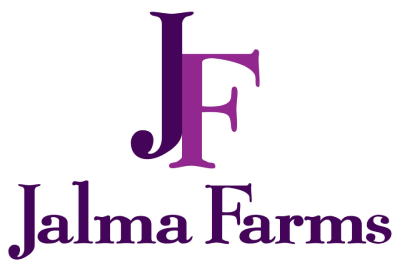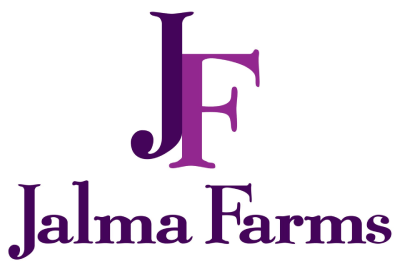Largest Grower of Black Aronia Berry in New Jersey
Jalma Farms is a 130-acre family farm in Cape May County at the southern tip of New Jersey that has been continuously farmed for over 330 years. It is currently owned and operated by John and Alma George. Alma is the 5th direct generation on the farm, 12th through marriage. Her great-great-grandfather was a founding member and first Secretary of the Cape May County Board of Agriculture, established in the 1860s, which continues today. Alma and John are proud to continue the farming tradition of growing sustainable native organic fruits while preserving open space and wetlands.
Jalma Farms is the largest grower of beach plums in the USA and the largest grower of Black Aronia Berry (commonly known as Black Chokeberry) on the east coast; also known as "America's Native Super Fruit." The harvested fruits are made into all-natural jams and syrups by Jalma Farms at the Rutgers Food Innovation Center in Bridgeton, NJ.

Slide title
Write your caption hereButton


The Benefits of Beach Plum and Black Aronia
These plants are native to the northeast region of the USA and have been studied for over 30 years by the USDA for their erosion control qualities. The Beach Plum helps prevent dune loss, just as the Black Aronia is used inland for soil stabilization. Both are used for wildlife habitat restoration and windbreaks. Jalma Farms actively supports these environmental efforts and has donated thousands of plants for those purposes. Jalma Farms has worked with various municipalities in Cape May and Atlantic Counties since 2006 to help restore the Beach Plum to the barrier islands.
The Beach Plum was found to be as high in antioxidants and antibacterial properties as the cranberry. The Black Aronia, our native super fruit, is higher in antioxidant capacity than any other fresh fruit they have studied in the world. Both fruits have their own unique, delightful flavors. They can be eaten raw or made into a variety of foods: jams, jellies, wine, craft beer, various spirits at local distilleries, vinegar, etc.
Fun Facts about the Beach Plum!
- Beach Plum, also known as Prunus maritima, is a member of the Rosaceae Family.
- They are a native species growing wild along the Atlantic Coastal areas between Maine and Virginia.
- Grows in a tree-like formation upwards of 10-20 feet or as a low, bushy spreading plant/shrub reaching widths of 10-15 feet.
- The fruit has a sweet-tart flavor and has a pit or stone similar to a cherry.
- The first record of the Beach Plum was in 1524 by Giovanni da Verrazano in Southern NY State who called them "damson" plums.
- Henry Hudson reported seeing an abundance of these "blue plums" on the banks of the river that now bears his name.
- In 1785 was named "Prunus maritima" by plant taxonomist Humphrey Marshall.
- In 2010, The Cape May County Commissioners declared the Beach Plum the Official Fruit of the County
Environmental Stewardship
At Jalma Farms, we are committed to preserving open space and protecting our areas' sensitive fresh and saltwater ecosystems. As part of these commitments, we are actively involved with efforts to restore the Beach Plum to the Barrier Islands as a means to preserve our New Jersey beaches. In addition, we are conducting studies on the dunes to determine the best planting methods for optimal survival rates and dune enhancement. We work with various municipalities to include the Beach Plum in their plantings. Through our efforts, and in conjunction with the Cape May County Beach Plum Association, we have planted thousands of Beach Plum Trees on the dunes in Southern New Jersey since 2006.
A portion of our profits, as well as our time, goes towards bringing back the Beach Plum to New Jersey's Barrier Islands and other environmental organizations.
Beach Plum Research
Over the past several years, various groups have been studying the Beach Plum. These studies have focused on the benefits of the tree and the fruit.
• The USDA's NRCS (Natural Resources Conservation Service) has been studying the Beach Plum for the past 30 years for use as a dune stabilization plant. • Cornell University has been researching the Beach Plum fruit since 1996 as a new commercial fruit crop. • Rutgers University Extension in 2007 began researching the beneficial properties of the Beach Plum. Initial studies have shown strong antioxidant levels, as well as antibacterial attributes just like cranberries.
Every summer, Jalma Farms harvests our crop of Beach Plums and Black Aronia Berries. The fruit is then processed and turned into our delicious jams, jellies, sauces, syrups and vinegar. Our products are made the same way with all-natural ingredients: Our own organically grown fruit, sugar, citrus pectin & calcium. To give our Pepper Jams that little extra kick, we add Jalapeño and Habanero Peppers. Jalma Farms jams, jellies, etc. have about ⅓ the sugar of regular jams; we use 62% fruit and only 36% cane sugar!
Our Delicious Jalma Jams
Jalma Jams, Jellies, and Syrups are made using all-natural ingredients with more fruit than sugar. Jalma Jams have 6-7 grams of sugar per serving compared to 12-14 grams of commercial brands. Our products are always: GMO-Free, Gluten Free, Dairy Free, Nut Free, Preservative Free, and Artificial Ingredient Free!
We are Beekeepers because we need the bees to pollinate our blooms! We harvest the excess honey from the bees (they make far more honey than they possibly need) and offer a variety of Natural Raw Honey products as well.
We look forward to sharing our delicious products with the world!

Slide title
Write your caption hereButton
Our Gallery
Reach out to our experts to learn more about our jams, including delicious jellies and syrups.
2424 Route 9, PO Box 42
Ocean View, NJ 08230































